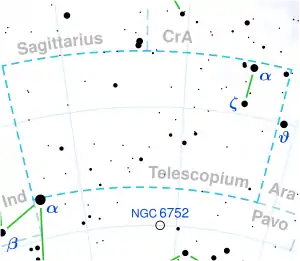HD 177406
HD 177406, also known as HR 7223 or rarely 47 G. Telescopii, is a solitary star[16] located in the southern constellation Telescopium. It is faintly visible to the naked eye as a white-hued point of light with an apparent magnitude of 5.95.[2] Gaia DR3 parallax measurements imply a distance of 369 light years[1] and it is currently approaching the Solar System with a heliocentric radial velocity of −6.2 km/s.[5] At its current distance, HD 177406's brightness is diminished by 0.23 magnitudes due to interstellar dust[17] and it has an absolute magnitude of +0.60.[6]
 | |
| Observation data Epoch J2000.0 Equinox J2000.0 (ICRS) | |
|---|---|
| Constellation | Telescopium |
| Right ascension | 19h 06m 55.60698s[1] |
| Declination | −48° 17′ 56.9195″[1] |
| Apparent magnitude (V) | 5.95±0.01[2] |
| Characteristics | |
| Evolutionary stage | main sequence star[1] |
| Spectral type | A0 V[3] |
| U−B color index | −0.02[4] |
| B−V color index | −0.01[4] |
| Astrometry | |
| Radial velocity (Rv) | −6.2±1.6[5] km/s |
| Proper motion (μ) | RA: +13.500 mas/yr[1] Dec.: −12.738 mas/yr[1] |
| Parallax (π) | 8.8414 ± 0.0541 mas[1] |
| Distance | 369 ± 2 ly (113.1 ± 0.7 pc) |
| Absolute magnitude (MV) | +0.60[6] |
| Details | |
| Mass | 2.64+0.43 −0.28[7] M☉ |
| Radius | 2.55±0.13[8] R☉ |
| Luminosity | 62.4+1.5 −1.4[1] L☉ |
| Surface gravity (log g) | 4.00[9] cgs |
| Temperature | 10,275+229 −194[7] K |
| Metallicity [Fe/H] | 0.00[10] dex |
| Rotation | 27.2 d[11] |
| Rotational velocity (v sin i) | 50 - 100[12] km/s |
| Age | 286±9[13][10] Myr |
| Other designations | |
| Database references | |
| SIMBAD | data |
HD 177406 has a stellar classification of A0 V,[3] indicating that it is an ordinary A-type main-sequence star that is generating energy via hydrogen fusion at its core. It has 2.64 times the mass of the Sun[7] and a radius 2.55 times that of the Sun.[8] It radiates 62.4 times the luminosity of the Sun[1] from its photosphere at an effective temperature of 10,275 K.[7] It has a solar metallicity at [Fe/H] = +0.00 and it is estimated to be 286 million years old,[13] having completed 58.66% of its main sequence lifetime.[1]
References
- Vallenari, A.; et al. (Gaia collaboration) (2023). "Gaia Data Release 3. Summary of the content and survey properties". Astronomy and Astrophysics. 674: A1. arXiv:2208.00211. Bibcode:2023A&A...674A...1G. doi:10.1051/0004-6361/202243940. S2CID 244398875. Gaia DR3 record for this source at VizieR.
- Høg, E.; Fabricius, C.; Makarov, V. V.; Urban, S.; Corbin, T.; Wycoff, G.; Bastian, U.; Schwekendiek, P.; Wicenec, A. (March 2000). "The Tycho-2 catalogue of the 2.5 million brightest stars". Astronomy and Astrophysics. 355: L27–L30. Bibcode:2000A&A...355L..27H. ISSN 0004-6361. S2CID 17128864.
- Houk, Nancy (1978). Michigan catalogue of two-dimensional spectral types for the HD stars: Declinations −53° to −40°. Vol. 2. Bibcode:1978mcts.book.....H.
- Alexander, J. B. (1972). "UBV observations of the RR Lyrae variable HD 176387 (MT Telescopii)". Royal Greenwich Observatory Bulletins. 174: 107. Bibcode:1972RGOB..174..107A.
- Gontcharov, G. A. (November 2006). "Pulkovo Compilation of Radial Velocities for 35,495 Hipparcos stars in a common system". Astronomy Letters. 32 (11): 759–771. arXiv:1606.08053. Bibcode:2006AstL...32..759G. doi:10.1134/S1063773706110065. eISSN 1562-6873. ISSN 1063-7737. S2CID 119231169.
- Anderson, E.; Francis, Ch. (May 2012). "XHIP: An extended hipparcos compilation". Astronomy Letters. 38 (5): 331–346. arXiv:1108.4971. Bibcode:2012AstL...38..331A. doi:10.1134/S1063773712050015. eISSN 1562-6873. ISSN 1063-7737. S2CID 119257644.
- Stassun, Keivan G.; et al. (9 September 2019). "The Revised TESS Input Catalog and Candidate Target List". The Astronomical Journal. 158 (4): 138. arXiv:1905.10694. Bibcode:2019AJ....158..138S. doi:10.3847/1538-3881/ab3467. eISSN 1538-3881. hdl:1721.1/124721. S2CID 166227927.
- Kervella, P.; Thévenin, F.; Di Folco, E.; Ségransan, D. (October 2004). "The angular sizes of dwarf stars and subgiants. Surface brightness relations calibrated by interferometry". Astronomy & Astrophysics. 426 (1): 297–307. arXiv:astro-ph/0404180. Bibcode:2004A&A...426..297K. doi:10.1051/0004-6361:20035930. eISSN 1432-0746. ISSN 0004-6361. S2CID 6077801.
- Anders, F.; et al. (August 2019). "Photo-astrometric distances, extinctions, and astrophysical parameters for Gaia DR2 stars brighter than G = 18". Astronomy & Astrophysics. 628: A94. arXiv:1904.11302. Bibcode:2019A&A...628A..94A. doi:10.1051/0004-6361/201935765. eISSN 1432-0746. ISSN 0004-6361. S2CID 131780028.
- Gontcharov, G. A. (December 2012). "Dependence of kinematics on the age of stars in the solar neighborhood". Astronomy Letters. 38 (12): 771–782. arXiv:1606.08814. Bibcode:2012AstL...38..771G. doi:10.1134/S1063773712120031. eISSN 1562-6873. ISSN 1063-7737. S2CID 118345778.
- Oelkers, Ryan J.; Rodriguez, Joseph E.; Stassun, Keivan G.; Pepper, Joshua; Somers, Garrett; Kafka, Stella; Stevens, Daniel J.; Beatty, Thomas G.; Siverd, Robert J.; Lund, Michael B.; Kuhn, Rudolf B.; James, David; Gaudi, B. Scott (2018). "Variability Properties of Four Million Sources in the TESS Input Catalog Observed with the Kilodegree Extremely Little Telescope Survey". The Astronomical Journal. 155 (1): 39. arXiv:1711.03608. Bibcode:2018AJ....155...39O. doi:10.3847/1538-3881/aa9bf4. S2CID 119515775.
- Andersen, J.; Nordstrom, B. (1983). "Radial velocities of bright southern stars. I - 139 B-type HR and FK stars". Astronomy and Astrophysics Supplement Series. 52: 471–482. Bibcode:1983A&AS...52..471A.
- Gontcharov, G. A. (November 2012). "Spatial distribution and kinematics of OB stars". Astronomy Letters. 38 (11): 694–706. arXiv:1606.09028. Bibcode:2012AstL...38..694G. doi:10.1134/S1063773712110035. eISSN 1562-6873. ISSN 1063-7737. S2CID 255202762.
- Gould, Benjamin Apthorp (1878). "Uranometria Argentina : brillantez y posicion de las estrellas fijas, hasta la septima magnitud, comprendidas dentro de cien grados del polo austral : con atlas". Resultados del Observatorio Nacional Argentino. 1. Bibcode:1879RNAO....1.....G.
- "HD 177406". SIMBAD. Centre de données astronomiques de Strasbourg. Retrieved April 30, 2023.
- Eggleton, P. P.; Tokovinin, A. A. (11 September 2008). "A catalogue of multiplicity among bright stellar systems". Monthly Notices of the Royal Astronomical Society. 389 (2): 869–879. arXiv:0806.2878. Bibcode:2008MNRAS.389..869E. doi:10.1111/j.1365-2966.2008.13596.x. eISSN 1365-2966. ISSN 0035-8711. S2CID 14878976.
- Gontcharov, George A.; Mosenkov, Aleksandr V. (28 September 2017). "Verifying reddening and extinction for Gaia DR1 TGAS main sequence stars". Monthly Notices of the Royal Astronomical Society. 472 (4): 3805–3820. arXiv:1709.01160. Bibcode:2017MNRAS.472.3805G. doi:10.1093/mnras/stx2219. eISSN 1365-2966. ISSN 0035-8711. S2CID 118879856.